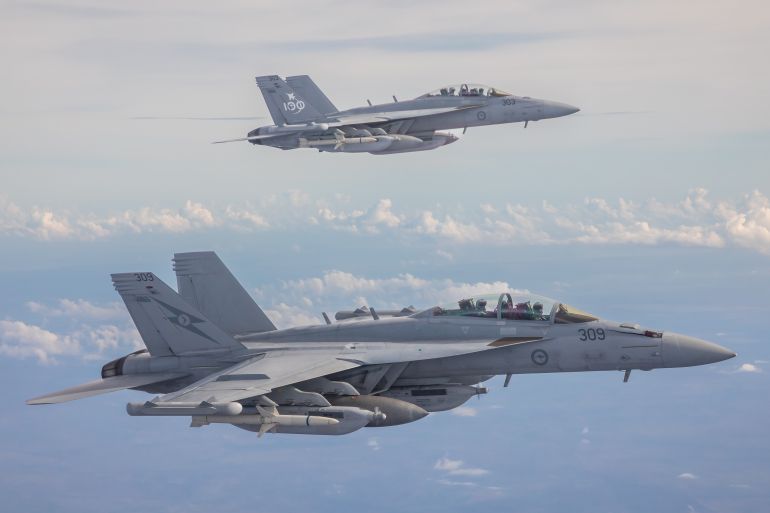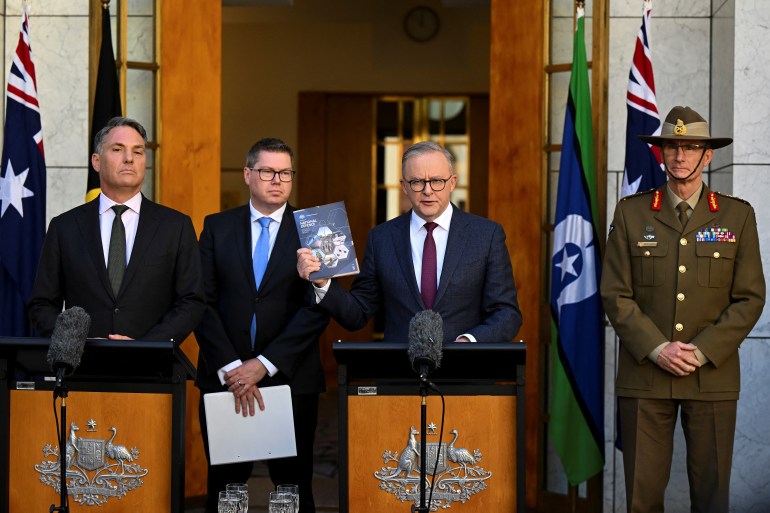Australia unveils biggest defence overhaul since World War II
Country will focus on longer-range capabilities and strengthening operations of its northern military bases.

Australia has said the acquisition of nuclear-powered submarines, long-range strike capabilities and its northern bases will be among the country’s six priority areas after a major review of its defence strategy found the armed forces were not “fully fit for purpose”.
Prime Minister Anthony Albanese initiated the Defence Strategic Review shortly after he was elected in May last year.
Keep reading
list of 4 itemsRussia names new commanders for Baltic and Pacific fleets
Australia, US and UK unveil AUKUS nuclear submarine plans
US to send more troops to Australia, invite Japan to joint drills
A redacted version of the classified Defence Strategic Review – led by former Australian Defence Forces chief Angus Houston and former Defence Minister Stephen Smith – and the government’s response was released publicly on Monday.
Noting that the US was “no longer the unipolar leader of the Indo-Pacific”, the review noted “major strategic power competition” had returned the region and its intensity “should be seen as the defining feature of our region and time”.
The defence overhaul comes amid rising tension in East Asia — particularly over the self-ruled island of Taiwan — and as China forges ahead with the modernisation of its military.
Albanese said the government would adopt three other priorities recommended in the review for immediate action: Initiatives to improve the growth and retention of a highly skilled defence workforce, improving Australia’s capacity to rapidly translate new technologies into defence, and a deepening of defence and diplomatic partnerships with “key partners” in the Indo-Pacific.
“The Defence Strategic Review, and the Government’s response, is about maintaining peace, security and prosperity in our region,” Deputy Prime Minister and Defence Minister Richard Marles said in a statement on Monday, stressing that work on the initiatives would begin straightaway.
“There are a lot of tough decisions which need to be made, but in doing so, we are making them in the best interest of our Defence Force and our nation.”

The report stressed the need for Australia to deepen its engagement and collaboration with countries from Southeast Asia to the Pacific, as well as with India and Japan.
Albanese noted the review’s recommendations would strengthen Australia’s “national security and ensure our readiness for future challenges” and also “help build a more secure Australia and a more stable and prosperous region”.
Analysts welcomed the report’s stress on “statecraft” and “all elements of national power”.
“The Defence Strategic Review is a welcome articulation of the need to integrate defence strategy and foreign policy,” David Andrews, a senior policy advisor at the National Security College at the Australian National University, told Al Jazeera in written comment. “These two elements must work in unison if Australia is to meaningfully address the emergent challenges in the Indo-Pacific.”
China ties
Albanese’s government has sought to repair Australia’s damaged relationship with Beijing, which deteriorated under the previous administration of Scott Morrison amid disputes over alleged foreign influence operations, trade and issues such as the COVID-19 pandemic and human rights.
Beijing was also angered over Australia’s decision to join the AUKUS pact under which it will receive the nuclear-powered submarines mentioned in the review from the United States, as well as its membership of the four-power defence and security grouping known as the Quad.
The Fujian, China’s third aircraft carrier, is currently undergoing propulsion testing and is a key component of the Chinese navy’s ongoing modernisation.
The ship is the country’s first carrier to be fully developed domestically and uses electromagnetic catapults and arresting devices to enable planes to take off and land on its deck. Marking the navy’s founding on Sunday, state media reported that the country was likely to need more carriers because of China’s “vast sea areas”.
Still, Marles stressed the need for Australia to develop a stable relationship with China, which he said was in the interest of both countries and the wider region.
“Australia will continue to cooperate with China where we can, disagree where we must, manage our differences wisely, and, above all else, engage in and vigorously pursue our own national interest,” Marles said.
With reporting by Bhavya Vemulapalli in Kuala Lumpur.